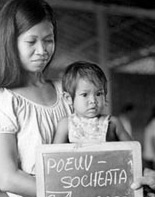 On Christmas Day a few years ago in Dallas, Texas, Socheata Poeuv's parents called a family meeting to tell her that her sisters weren't really her sisters, and her brother was not her full brother. After 25 years of attempting to live a "normal American life," her parents revealed a shocking family secret that would draw them all back to Cambodia, the home they fled and struggled to forget during the fall of the Khmer Rouge in 1979. As she packs for her trip back to Cambodia, Socheata turns to the camera and confides, "I knew more about the Holocaust than the Khmer Rouge. I knew even less about my own family."
On Christmas Day a few years ago in Dallas, Texas, Socheata Poeuv's parents called a family meeting to tell her that her sisters weren't really her sisters, and her brother was not her full brother. After 25 years of attempting to live a "normal American life," her parents revealed a shocking family secret that would draw them all back to Cambodia, the home they fled and struggled to forget during the fall of the Khmer Rouge in 1979. As she packs for her trip back to Cambodia, Socheata turns to the camera and confides, "I knew more about the Holocaust than the Khmer Rouge. I knew even less about my own family."
Socheata Poeuv documents the unfurling of her family mystery in a beautiful, strong film called New Year Baby. After arriving in Cambodia, Socheata narrates the film through a series of interviews with her parents, relatives, and even the former Khmer Rouge leader who supervised the labor camp where her parents were forced to work. In one exchange that filled me with both dread and loathing, Socheata asks the former KR district manager, now a poor farmer, if the thousands of dead weigh upon him. Chillingly, he explains, "No. They do not come to conscience," and "I have forgotten so much." Shocked, Socheata presses him for more but the only thing he has left to say is, "I am sorry for the mismanagement of my district." He shifts on the dirt floor as his wife fries some fish for Socheata's mournful, exhausted Pa.
Ma and Pa Poeuv emerge as heroes by the end of the film. Ma's compassion for orphaned children and Pa's courage as he leads his family through minefields, gunfire, and across borders are stories that Socheata calls "remarkable, but common." When you watch the film, you'll find yourself marveling at how simple, ordinary people can be fiercely courageous, unconditionally loving, and self-sacrificial -- and you'll wonder about your own capacity to "go and do likewise."
For Socheata, what had started as a "glorified home video" turned into a 90-minute film, which in turn led to a significant human rights effort to document and archive testimony of what it was like to live under a regime some call "the most controlling government in history." Socheata's latest project is Khmer Legacies, a nonprofit whose goal is to videotape testimonies of thousands of Cambodian survivors by having children interview their parents. Socheata knows firsthand the importance of storytelling through the generations: After New Year Baby was screened at a film festival in Dallas, Texas, Socheata brought her parents and entire extended family up to the stage. Upon seeing the 300+ audience give Ma and Pa Poeuv a standing ovation and wait in line to shake their hands, Socheata recalls, "It really was that experience of having the audience affirm their story that transformed their relationship to their past. More than anything, they had never been honored like that before in their whole life. These are broken-English immigrant people who are invisible in our society." Socheata's film and new nonprofit shed some light and heart on the Cambodian genocide and the importance of "Never Again."
Curious about the family secret? Tune in this Tuesday, May 27, for the national premiere of New Year Baby on PBS. Here's a preview:
 Anna Almendrala is the marketing and circulation assistant for Sojourners. To learn more about Khmer Legacies, visit their Web site: www.khmerlegacies.org
Anna Almendrala is the marketing and circulation assistant for Sojourners. To learn more about Khmer Legacies, visit their Web site: www.khmerlegacies.org
Got something to say about what you're reading? We value your feedback!